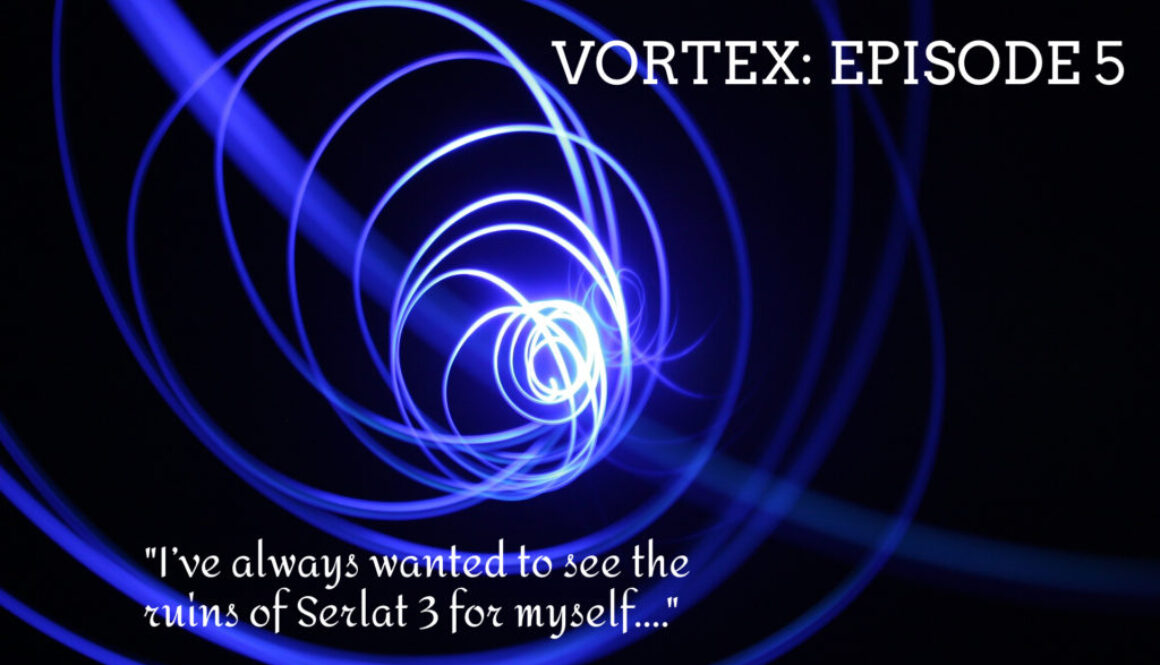Granular, Episode 9: Schrödinger’s Categorical Imperative
[Editor’s note: read the entire story from the beginning.]
As Colin and the others worked to undo the booby-trap that the Alegarli had set in their underground headquarters on Haliak, reports of unusual phenomena trickled in from across the Cosmic Consortium.
Despite the inherent danger, the news gave Zach a grim satisfaction.
Now they see it, he told himself.
But soon enough, the severity of the situation seeped into every corner of his mind. No matter how he shaded it, the Alegarli had developed an entirely new category of Doomsday weapon. Their transmat-latency disruptor was unlike anything that the civilized world had seen since the arrival of the first crude nuclear weapons.
At the moment, however, Zach was limited to what he could accomplish on a small quantum tablet from the confines of his hospital bed. While he’d sketched the broad outlines of a countermeasure, he could go no farther without his accustomed mix of controlled testing and spontaneous improvisation. And that was aside from insights gained through daily interaction with a team of specialists.
So when Colin walked into the room that morning, Zach’s despair was etched deep into his young face.
“Running out of time, aren’t we?” asked Colin. “Once Dalamacras shakes the bugs out of his prototype, he’ll issue his demands to every world government. There’s no going back from that.”
Zach pointed to his bed.
“Can’t you get me out of this … cage?” he asked.
“We might have a solution,” said Colin, “but you won’t like it.”
As Colin explained, his engineering team had been unable to confirm or deny Dalamacras’ claim that the entire installation would explode if Zach stepped out of bed. It was possible the Alegarli leader had been bluffing. Not willing to take the risk, and with time growing short, only one option remained.
“Transmat?” said Zach. “You have to be kidding.”
But Colin promised him that the transmat pods in the Haliak facility were not made by Ultramat.
“Besides,” he said, “aren’t you a little tired of that bed pan?”
Zach hung his head. To think that the life of everybody in the facility could turn on his bathroom privileges. And yet, if his efforts failed, how much longer could they stay safe, anyway?
He finally agreed, but insisted on breaking his spatiotemporal transfer into a series of short jumps. That way, he hoped to reduce the possibility for a hazardous build-up of transmat latency. Based on his calculations, the latency zone of every commercial transmat device was too broad. Ultramat had simply taken that design flaw to extremes.
Fortunately, the gamble worked. After thirty-six hours of interplanetary hopscotch, Zach, Colin and a few other essential operatives finally materialized in a secure WorldGov Intel base on the outskirts of the Kewley sector. They’d evaded Dalamacras’ sabotage. Assuming, that is, the threat had been real. Zach was exuberant.
Not so exuberant were his bed-ridden legs. But after a standard course of nanobot treatments, he was almost back to normal. Before long, he’d even designed a series of experiments that he hoped would lead to a solution. Already, his understanding of the physics behind transmat tech had grown exponentially.
“When this is over,” he said, “we must rework this technology from scratch.”
“Right.” said Colin. “We’ll reinstate the Tooth Fairy while we’re at it, too. Now. Where are we?”
Zach looked down at his hands.
“Somewhere,” he said. “But the trick is knowing where the Alegarli are. There’s no use repairing one section of space-time if they can rip open an even bigger hole at a different set of coordinates.”
While a cosmic “repair kit” would be extremely useful in the short run, it would only enable them to play catch-up. The Alegarli would still be able to set the agenda, by striking when and where they chose. Anything short of actually neutralizing the threat of the Alegarli Doomsday weapon would be a waste of time.
“Let’s go full steam on your gravity modulator … thing,” said Colin. “But what we also need is a way to make their weapon inoperable.”
“We’d have to change the laws of physics,” said Zach. “That, I don’t recommend.”
“Too bad we can’t make the Alegarli ‘inoperable,’” said Colin.
“What?” asked Zach. “You can’t mean … genocide?”
Colin’s face flushed.
“What do you take me for, Griffin?” he said. “I read … I read a story on the newsnets that got me thinking is all. I invited the reporter here. Think you’d have time to meet with him?”
“Dunno,” said Zach. “Journalists rarely get much right. Send me a copy and I’ll think about it.”
A second later, and article entitled “The Mysterious Alegarli: A Critical Vulnerability?” appeared on Zach’s monitor. Though the headline made him snicker, the article captured his attention from the first paragraph.
Up until now, little was known about the elusive Alegarli. But a recently released Crelenk prisoner reveals a shocking weakness that some say could change the balance of power throughout the Cosmic Consortium.
Zach’s eyes bulged as he read of a parasitic microsporidian fungus that had once had a devastating effect on bee colonies on the human originworld. The last he’d heard, the fungus was strictly a matter of ancient history; it had been eradicated a few years before the development of the first practical Alcubierre engine. As it happened, a similar species of fungus had developed since then, on a few worlds at the fringe of the Consortium
But just as startling as the theme of the article were the details it revealed about the Crelenk prisoner. Apparently, she’d overheard some worried Alegarli chatter about the fungus and woven it into a new song, which she’d released only a week earlier.
”Loor TreVal is free?” Zach whispered.
Why had the Alegarli released her? It must mean, he decided, that they were ready to unleash their dangerous new weapon, and had nothing left to hide. All the same, Loor’s revelation suggested one way to thwart the Alegarli’s diabolical plan. If the ancient Earth fungus could be reconstructed with state-of-the-art genome mapping and adapted to the Alegarli, it would pose a potent counter threat. WorldGov would have the upper hand in any ceasefire talks.
Yet no matter how simple his plan seemed, Zach knew that there was no guarantee they could develop the new bioweapon in time. That was aside from the ethical issue. If enough of the fungus were released by accident, it could lead to a mass extinction of the Alegarli. When Zach voiced his doubts to Colin, the pragmatic soldier shrugged.
“Every new weapon system comes with risks,” said Colin. “Did you ever see an overheated particle gun explode? It’s not pretty. But we’ll use top engineers and make our new toy as safe as possible.”
As they talked, Zach realized that the bioweapon would need to be targeted and fired remotely. It was the only way to catch the Alegarli off guard. Though the plan made sense in broad brushstrokes, obstacles cropped up when they discussed it with the wider WorldGov Intel team. Theresa DuBois, the team’s chief engineer threw the first cup of cold water.
“The Alegarli android shell has a sophisticated ventilation and air filtration system,” said Theresa. “Here, look at this.”
Colin and Zach stared at the holographic diagram that Theresa had called up on a secure videocom.
“The system refreshes every ten blinks,” she said. “That’s the only way a thousand insectoids can stay alive inside there.”
“At that rate, we could never get the pathogen to take hold,” said Martin Clavel, the resident epidemiologist. “At best, it would be slow progress — too slow for a real-time assault, I think.”
As it turned out, a fleet of sick Alegarli would still have time to inflict widespread damage before it collapsed.
“I see that,” said Colin. “What about their food supply?”
“According to this schematic,” said Theresa, “they use their android shells to ingest a series of capsules at regular intervals. Entire squadrons of insectoids inhabit a gut-like area inside each shell, where they process the capsules into a digestible jelly. Another group distributes the jelly to the rest of the shell population.”
If the Alegarli’s nutritional capsules could be contaminated, the humans would have an effective counter weapon. Soon experts from across WorldGov were called in, to discuss implementation. Yet neither the source nor the precise contents of the capsules were common knowledge.
Finally, late that night, Zach’s comstreamer buzzed with a call from a member of the Intel Corps research team. The meek voice on the other end of the line was barely audible, but its message was clear. A journalist had published an article about the small consortium of manufacturers who produced the Alegarli food supply. But she’d so far refused to divulge her sources.
“We thought maybe you could convince her,” said the voice. “It’s Paula Altenberg of the Sidereal Chronicle. You know, the journalist who….”
“I’m familiar,” said Zach.
Though his second and third near-death experiences had pushed his obsession with Paula to the back of his mind, he had hardly forgotten her voice, her eyes, the way she tossed her hair….
“Professor Griffin?” the voice said. “Sorry, I just have to report to my superiors. Will you make contact?”
“But how can I call her? I’m supposed to be dead.”
Trouble was, Paula was the only known source of information about the capsules. He took down her comstreamer contact, but wondered what kind of call it would be. As usual, his hyperactive imagination overlooked Reality’s tendency to turn a beautiful daydream into a dreary mundanity. The comstreamer contact was Paula’s business line and he heard nothing on the other end but a typical voicemail recording.
She’ll have to get back to me, Zach’s sullen mind reflected, like a crank caller, or an android sales rep.
But rather than torment himself further, he was determined to work out a bit more of the theoretical background for his counter weapon. Particularly nagging was how to establish the correct angle of deflection for the Alegarli disrupter. Too much and the counter weapon would do massive damage on its own.
Compounding the problem, Zach didn’t even have a rough schematic of the Alegarli weapon. He was forced to imagine the most likely form it could take, given the properties of transmat latency-overlap.
“I’d kill for a diagram,” he heard himself say, then dissolved into exhausted giggles. “Kill? Seriously?”
But Zach’s manic frustration was short-lived. His fit of coughing laughter was interrupted by the distinctive buzz of his implanted comstreamer. Yet the intimate conversation with Paula that he’d hoped for stayed stubbornly out of reach.
“Can’t reveal my sources,” she said. “If my editor found out, I’d be out of a job and out of my profession for good.”
“Forget that,” said Zach. “What we need is the composition of the capsules, their weight and volume, so we know how to replicate them. Better yet, the coordinates of their manufacturing plants.”
“Assuming I have that kind of data,” said Paula, “I’d never risk telling you over a comstreamer. These days. every neutrino has ears. We’d have to meet offline, preferably at an open-air restaurant, where surveillance is less likely and there’s lots of chatter to cover our voices.”
While Zach acknowledged her premise, the location she suggested was harder to accept.
“Mars?” he said. “Nobody goes there anymore. Do they even have computerization?”
Paula’s rich laughter made every blood vessel in Zach’s body vibrate.
“Don’t be a snob,” she said. “Yes, Mars is a little behind the times. That’s what makes it less of a security risk. I grew up there. You’ll be fine. Just remember to wear your galoshes.”
“My what?” asked Zach.
“Forget it,” said Paula. “It’s an old Earth expression. Now, I’m going away on assignment tomorrow, so I’ll be out of touch. But I’ll send you my calendar and you can contact my personal assistant. I’ll get the message and I’ll see you there.”
“But…” said Zach.
“Gotta run,” said Paula. Her voice link went dead, but the next second, her calendar appeared as an encrypted symbol on his handheld. A few clicks later, his handheld had created a holojection that marked off her every availability for the next month. Included were the coordinates of the restaurant she’d mentioned, and a personal note.
“See? You never know.”
Though Zach wanted nothing more than to daydream over what she might have meant, he had to keep moving. How, he wondered, could he convince Colin to let him travel to a planet at the very edge of the Cosmic Consortium? As things stood the next morning, Zach’s odds were as far down in the statistical basement as possible.
“What flavor of psychotropic soup did she serve you, anyway?” asked Colin. “First off, it would take three rotations each way. You’d be asking the Alegarli to pick you off.”
“They think I’m dead, remember?” asked Zach.
“Maybe they thought that,” said Colin. “We certainly put enough effort into your funeral and the obits. Sorry to say, we couldn’t spare your family. But the first thing you learn in Intel is that nothing is forever. It’s a new deal every day. Last night, we found a transmitter on a waiter in the mess hall.”
“So, I guess what I’ve heard about WorldGov stealth tech is a load of … dark matter,” said Zach.
“Cute,” said Colin. “Of course, we could put you in a stealth ship. I could even send you with two theta-class androids for bodyguards and an emergency transmat protocol to get you out of there at a moment’s notice. But at some point, you’d be all alone with this reporter on freaking Mars. And from the look in your eye, I’m not convinced the conversation would be all business.”
“I can take care of myself,” said Zach.
Colin slapped his forehead.
“You want to rethink that?” he asked.
They argued for hours, but Zach knew he had the upper hand. Without Paula’s information — or at least the data he hoped she had — there was only a slim chance of success.
So it was that a mere ten days later, Zach boarded a compact star ship with two security androids outfitted to look as if they were his siblings, complete with paperwork to back up the cover story of a family vacation to Mars. Inside the Intel Corps’ secure spaceport, Colin had a final piece of advice.
“Just keep this in mind,” he said. “Nobody’s from Mars. I don’t care what she told you. You’ll see when you get there. She’s working some angle, I’m telling you. So keep A24 and A19 with you at all times.”
Zach smiled.
“You mean Kieran and Abagail?” he asked.
“Right,” said Colin. “Get them a separate table at the restaurant. They can simulate eating. But if one of them complains of a stomach ache….”
“We’ve been over this,” said Zach. “I have to go. I’m the one who started this downhill race to stop the granular effect. Can I help it if solving the problem involves meeting with a beautiful woman?”
“You sure that’s what she is?” asked Colin. “Ask yourself: How come she keeps turning up, ever since you landed on Haliak? I know, I know, the universe contains one of everything. Everything except that much coincidence tied up in string.”
Zach’s face went pale and he opened his mouth to speak but was interrupted by a stern voice on the spaceport’s intercom.
“Colonel Harris,” it said. “Clear the area immediately. Launch is in sixty blinks unless you want to scrub. Space-time waits for no man.”
Colin shook his head, saluted Zach and rushed off. The voice, unfortunately, had been right. Even the miracle of space folding imposed a strict launch window. Leaving a minute too late could mean Zach would miss his date with Paula by as much as a week.
And yet, as the ship cleared the spaceport dome and began to disappear into the starry night sky, Colin couldn’t help obsessing over the latest Intel on the highly regarded reporter from the Sidereal Chronicle.
Not substantiated, he reminded himself. But as he returned to his office that simple phrase did nothing to sooth the aching pit that had replaced his stomach.
^^^
Mark Laporta is the acclaimed author of the Changing Hearts of Ixdahan Daherek series and the new novel, Probability Shadow, published by Chickadee Prince Books, available now in paperback or ebook on Amazon, Barnes & Noble or at a bookstore near you.
Illustration by Collin00b/Pixabay



 Bleenor scrambled to say something, before the telepathic symbiote detected his thoughts about the orange globe.
Bleenor scrambled to say something, before the telepathic symbiote detected his thoughts about the orange globe.


